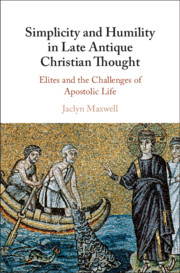 Simplicity and Humility in Late Antique Christian Thought
Simplicity and Humility in Late Antique Christian Thought Book contents
- Simplicity and Humility in Late Antique Christian Thought
- Simplicity and Humility in Late Antique Christian Thought
- Copyright page
- Dedication
- Contents
- Acknowledgments
- Abbreviations
- Introduction
- Chapter 1 Roman and Early Christian Attitudes toward Social and Economic Divisions
- Chapter 2 Christian Attitudes toward Social and Economic Divisions in Late Antiquity
- Chapter 3 Tentmakers and Fishermen
- Chapter 4 Apostolic Simplicity and Elite Education in Late Antique Theological Controversies
- Chapter 5 The Virtue of Humility in Late Antiquity
- Conclusions
- Bibliography
- Index
Chapter 1 - Roman and Early Christian Attitudes toward Social and Economic Divisions
Published online by Cambridge University Press: 26 March 2021
- Simplicity and Humility in Late Antique Christian Thought
- Simplicity and Humility in Late Antique Christian Thought
- Copyright page
- Dedication
- Contents
- Acknowledgments
- Abbreviations
- Introduction
- Chapter 1 Roman and Early Christian Attitudes toward Social and Economic Divisions
- Chapter 2 Christian Attitudes toward Social and Economic Divisions in Late Antiquity
- Chapter 3 Tentmakers and Fishermen
- Chapter 4 Apostolic Simplicity and Elite Education in Late Antique Theological Controversies
- Chapter 5 The Virtue of Humility in Late Antiquity
- Conclusions
- Bibliography
- Index
Summary
In Roman society, the upper classes operated according to their own social “common sense” that determined how they viewed themselves in contrast to people with less money, less prestige, and less power. Their social values and self-presentation, which would later be at odds with certain Christian teachings, were not monolithic: in some contexts, Roman writers idealized austere peasants and criticized the extravagantly wealthy; at other times, any association with agricultural or manual labor would be an easy way to attack an enemy or dismiss a rival. Roman writers of the first and second centuries CE reflected (and helped to establish) the conventional ideas about social and economic status, which would be the starting points for upper-class worldviews in Late Antiquity. In addition to sharing much of the mindset of the broader society, Christian writers in the early Empire also drew upon Jewish and Christian sacred texts when they discussed issues related to economic disparity and social hierarchy. This chapter will examine these conventional Roman social attitudes and then turn to focus on the early Christians. The contrast between how upper-class Roman writers and early Christian writers (many of whom were also from well-off backgrounds) viewed social and economic divisions – such as the value they placed on manual labor – will provide the basis for examining how the social “common sense” would change in Late Antiquity.
- Type
- Chapter
- Information
- Simplicity and Humility in Late Antique Christian ThoughtElites and the Challenges of Apostolic Life, pp. 12 - 33Publisher: Cambridge University PressPrint publication year: 2021


